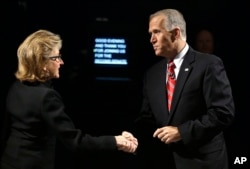If you want to get a good read on what is driving U.S. voters in advance of the November midterm congressional elections, check in with the people of North Carolina.
North Carolina has become one of the preeminent swing or battleground states in national politics in recent years. President Barack Obama won the state in the 2008 presidential election but narrowly lost it to Republican Mitt Romney two-years-ago.
The state also features one of the crucial races this year that could decide which party will control the Senate in January.
Democratic incumbent Senator Kay Hagan is in a close battle with Republican Thom Tillis in an expensive race that is getting a lot of national attention. A Hagan victory might suggest Democrats have a better chance to hold on to their majority in the Senate. A win by Tillis would likely suggest a Republican sweep of many of the key Senate races around the country.
North Carolina also figures to be a key state in the 2016 presidential election.
Raleigh-based political analyst John Davis says an influx of outsiders from northern and Midwestern states in recent years has transformed the state from a reliably conservative bastion to one of the most competitive on the national scene.
“It has changed who we are,” he said. “It has turned us into a political battleground state, a perfectly level playing field, much more moderate than the typical conservative state of as recently as 30- years-ago.”
Sharp political divides
You don’t have to venture far from Raleigh to get a sense of how varied the political scene is in North Carolina these days.
At a recent Moral Monday March in the town of Wilson, the Reverend William Barber made an impassioned plea to hundreds of mainly African-American residents to register to vote for the upcoming election.
“All Americans must have the right to vote—unhindered, unabridged, un-denied!” said Barber, the president of the North Carolina N.A.A.C.P. who has emerged as a leading civil rights figure.
Lately, he has been taking on the Republicans in state government and Tea Party activists who have held sway in the state in recent years.
“This movement is about an intense focus using our deepest moral values from the scriptures of many faiths and our deepest moral values from the Constitution and challenging extremism that is trying to lead us in a regressive turn throughout America,” he said.
Barber’s effort to rally liberal voters has the support of peace activist John Heuer. Heuer is with a group called North Carolina Peace Action that opposes war and demands the immediate withdrawal of all remaining U.S. forces in Afghanistan.
“It is bringing together people that have been marginalized,” Heuer said. “Poor people, people of color, women, children, elderly to declare their rights under the Constitution of North Carolina and the United States and that government policies should work to benefit the people of the state and not just particular interests and parties.”
But Republican and conservative activists are also eager for the November 4 election, fueled in large part by growing voter dissatisfaction with President Obama.
Not far outside downtown Wilson you can find Joel Killion, an activist with the Wilson NC Tea Party. Killion has a far different view on the size and role of government and says he and his fellow organizers hope to have an impact on the voting in November.
“I don’t see Obama as the problem,” he said. “I don’t see Democrats as the problem. I don’t see the Republicans as the problem. I see progressivism, the ideology. We call it today liberalism.”
You might expect Killion to automatically support the Republican Senate candidate Tillis. But Killion has yet to make up his mind in part because he says the Republican-controlled state legislature and governor have not done enough to control government spending.
“Liberalism, progressivism in the classical sense even going back to 1890 when the Progressive Era started, that is really the poison that I believe entered into the country and grew this idea of a massive bureaucratic, paternalistic government,” Killion said.
And by all means don’t leave out the Libertarians. Sean Haugh is the Libertarian candidate for Senate (in between his pizza deliveries) and his campaign videos on YouTube have caused a sensation.
“You should be free to live your life as you see fit according to your values instead of having some kind of self-appointed master, whether it is government or corporate or whatever, coming in to tell you how to run your life according to their needs,” Haugh said.
Haugh is well back in the polls in the Senate race but could play the role of spoiler if the contest remains close.
Issues: Economy, IS and Ebola
At a farmer’s market in the state capital, Raleigh, a random survey of voters found a mix of domestic and foreign policy issues of concern.
“The most important thing for me would be education. I believe all children should have a chance at quality education,” said a woman named Caresha who took a breaking from shopping.
But for Ethan Hill of Raleigh, a recent transplant to the area, the threat posed by the so-called Islamic State militant group has jumped to the top of the list.
“The issues over in Iraq and overseas, homeland defense, I guess, is a big issue,” Hill said.
For Niki Morock, it’s a combination of domestic and foreign policy concerns.
“For me it’s the economy,” Morock said. “It’s national security. Those are the two big things.”
The Ebola scare is starting to register with voters as well. The issue has come up on the campaign trail and in debates between Hagan and her Republican challenger Tillis. It’s an issue that is quickly becoming a national concern and a test for the Obama administration as it moves to reassure the public. A recent Wall Street Journal-NBC News poll found that 98 percent of those surveyed have heard or read about the virus outbreak.
All of this makes North Carolina an excellent place to explore the issues and voter attitudes driving this year’s midterm elections.
Mitch Kokai is with the John Locke Foundation, a group that advocates free enterprise principles in North Carolina.
“We have people who are very conservative, very interested in market-based reforms and we have people who are very much on the other side of the fence saying government needs to play a major role in making sure that North Carolina gets to where it needs to be,” Kokai said.
Kokai predicts North Carolina will remain important on the national political scene for 2016 and beyond.
“I think you are going to see a very strong fight for North Carolina in 2016 and unless something major happens in the way that our politics operate, probably for the foreseeable future beyond that,” Kokai said.
Analyst John Davis agrees.
“North Carolina is the new Ohio,” he said. “It is the state that could tip the results for the race for the White House one way or the other in 2016.”







